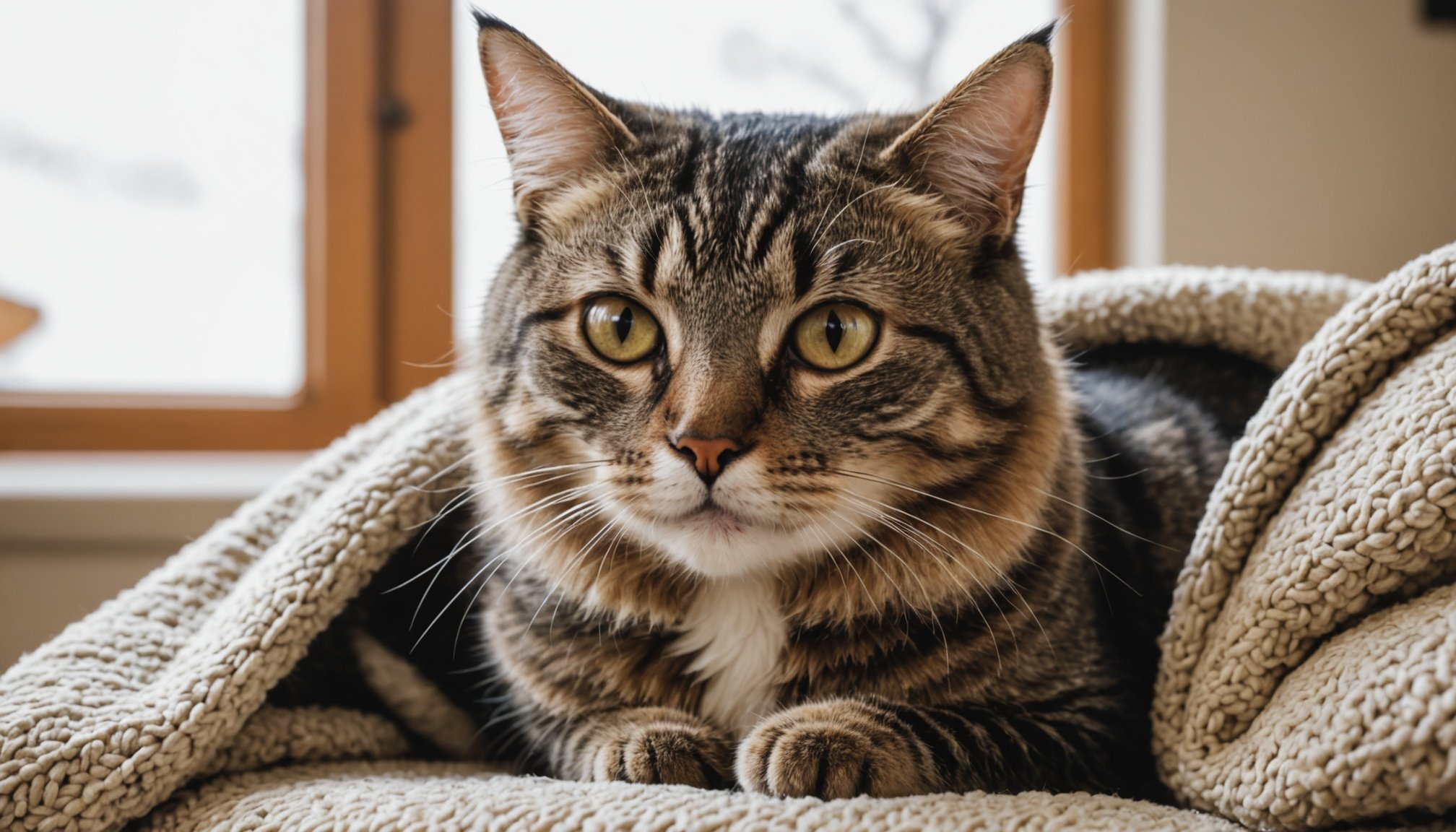Understanding Feline Herpesvirus and Its Implications
Feline herpesvirus is a contagious virus affecting many cats worldwide. The virus primarily targets the respiratory system, leading to various health issues. Cats typically contract this virus through direct contact with infected animals or contaminated objects.
Common Symptoms During Flare-Ups
During flare-ups, cats exhibit multiple symptoms indicating the presence of the virus. Common symptoms include sneezing, nasal discharge, and conjunctivitis. Some cats may also show signs of lethargy and loss of appetite. These symptoms can vary in severity, often requiring close monitoring by pet owners to prevent complications.
Avez-vous vu cela : Essential Tips for Maintaining Your Cat”s Diet to Prevent Urinary Tract Infections
Long-term Implications for Affected Cats
Once infected, cats can become chronic carriers of the feline herpesvirus, potentially facing recurring flare-ups throughout their lives. The long-term implications include persistent health issues and the potential for secondary infections due to the weakened immune system. Cats with chronic infections need regular veterinary care and a stress-free environment to manage the symptoms effectively. Understanding the full impact of feline herpesvirus on cats helps owners to provide optimal care and support, aiding in their pet’s comfort and well-being.
Creating a Comfortable Environment
Creating a cozy sanctuary for your cat not only elevates their comfort but also contributes to their overall well-being. Start by adjusting the living space to reduce stress. Ensure your cat has warm, quiet resting areas away from household noise. These spots can serve as safe havens where your cat can retreat if they feel overwhelmed.
A voir aussi : Essential Tips for Maintaining Your Cat”s Diet to Prevent Urinary Tract Infections
In addition to a tranquil environment, maintaining familiar scents enhances your cat’s comfort. Cats rely heavily on their sense of smell to navigate their world – introduce familiar scents by placing your cat’s favourite toys or blankets in their resting areas. Another essential element is providing toys that engage your cat in play, replicating natural hunting scenarios or simply providing entertainment.
The importance of these steps cannot be overstressed. A comfortable environment reduces anxiety and encourages natural behaviours. Cats are creatures of habit, and consistency in their environment provides a sense of security. Investing time and thought into creating such an environment fosters a deeper bond between you and your cat while enhancing their quality of life.
Beyond these, consider climatic comforts like maintaining moderate room temperatures, as cats often seek warm nooks for rest. Combine these practices, and your home will soon become a true cat comfort haven.
Dietary Support for Cats with Feline Herpesvirus
Feline Herpesvirus can challenge a cat’s immune system, making nutrition for sick cats crucial. To fortify immunity during flare-ups, offer foods rich in nutrients such as omega-3 fatty acids and vitamin E. These can help reduce inflammation and support the immune response. Wet food can be particularly beneficial as it not only is often more palatable for ailing cats but also contributes to hydration, an essential aspect of recovery.
Dietary suggestions include incorporating high-quality proteins which are fundamental for repair and recovery, and easily digestible meals that are gentle on the stomach. Enhancing hydration is vital: if cats seem reluctant to drink water, consider options like broth or a feline fountain to encourage fluid intake.
For immune support, some supplements may be helpful. For instance, L-Lysine is often recommended by veterinarians to reduce viral shedding and recurrence. Additionally, probiotics can foster a healthy gut microbiome, indirectly supporting overall immunity. Before introducing any new supplements, consult a veterinarian to ensure they suit the specific health needs of your feline companion. With these strategies, you can provide beneficial dietary support to help manage and alleviate symptoms.
Medication and Treatment Options
For managing feline herpesvirus, there are several treatment avenues available. Veterinary care often includes the prescription of antiviral medications such as famciclovir. This medicine helps control virus flare-ups, offering relief to your cat by reducing symptoms like sneezing and nasal discharge. Furthermore, lysine supplements might be recommended to support the immune system, albeit their efficacy remains under debate.
It’s crucial to be aware of potential side effects. While these medications are generally safe, some cats may experience gastrointestinal discomfort or lethargy. Regular monitoring allows for adjustments to ensure optimal health.
When considering treatment options, it’s essential to maintain open communication with your vet. They can tailor advice to your cat’s specific needs, particularly if standard medications prove ineffective.
Some situations might warrant exploring alternative treatments. This can include holistic approaches or adjusting the current medication plan. If symptoms persist or worsen, a prompt consultation with your veterinarian is crucial for determining the next steps in your cat’s treatment journey.
By staying informed and proactive, you can enhance your cat’s comfort and quality of life while managing this chronic condition.
Stress Reduction Techniques
In managing stress, both for humans and cats, creating a calming atmosphere is crucial. From dimming lights to playing soft music, many relaxation techniques can set the scene for tranquility. Aromatherapy using pet-safe scents can also aid in stress management by soothing the senses.
Play and interaction are equally vital. Regular play sessions stimulate both physical and mental health in cats, promoting well-being while reducing stress. Engaging toys and environment-enrichment activities can help alleviate feelings of anxiety for cats, especially those dealing with stress.
For sick cats, maintaining a consistent routine becomes even more important. Predictability in daily activities gives them a sense of security. Feeding, grooming, and playtime should occur at the same time each day to help manage stress and contribute to their recovery.
To ensure cat well-being, it’s essential to pay attention to their behavioural cues. Recognize signs of stress, such as excessive grooming or withdrawal, and respond with appropriate stress-reducing measures. Providing a safe and familiar environment can help alleviate anxiety, encouraging a more peaceful existence for them. By combining these approaches, you can significantly enhance your cat’s quality of life, supporting their overall well-being.
Emotional Support for Cat Owners
Caring for a beloved pet, while rewarding, can sometimes take an emotional toll on cat owners. Recognizing and managing caregiver stress is crucial to maintaining your emotional health. It’s common to feel overwhelmed, and acknowledging these feelings is the first step. Resourceful cat owner resources are available to help manage these challenges.
Several types of support are accessible to pet owners. Emotional support for pet owners can come in the form of community engagement or professional guidance. Many find solace in joining local or online communities where sharing experiences and advice can provide comfort and understanding. These groups offer valuable perspectives and support from fellow cat owners who have experienced similar situations.
In addition to community support, seeking professional support options is highly beneficial. Pet psychologists or support hotlines can guide you on managing stress and building resilience. They offer strategies tailored specifically for pet caregivers to help maintain balance and emotional well-being.
Here is a brief outline of support sources:
- Online communities: Forums, social media groups, and websites
- Local support groups: Pet owner meet-ups, workshops
- Professional services: Counseling, therapy sessions
These resources are essential in fostering a healthy relationship with your pet while preserving your emotional health.










